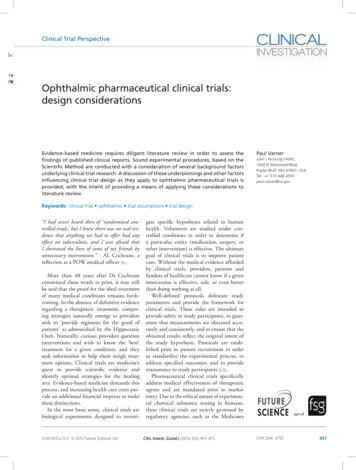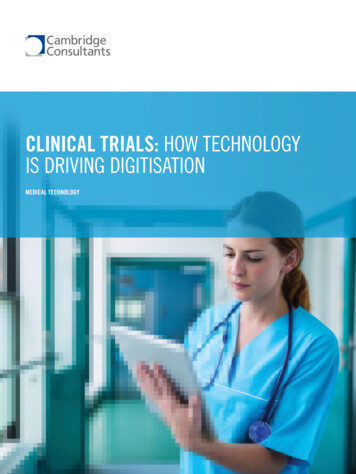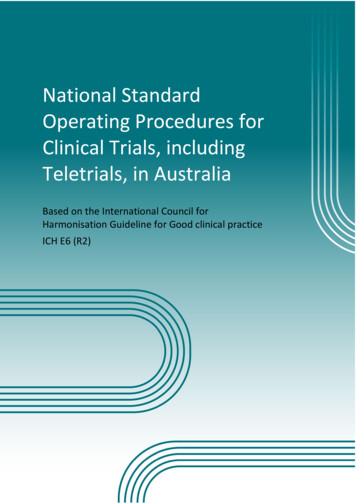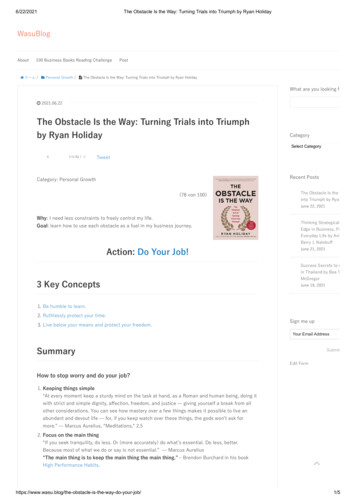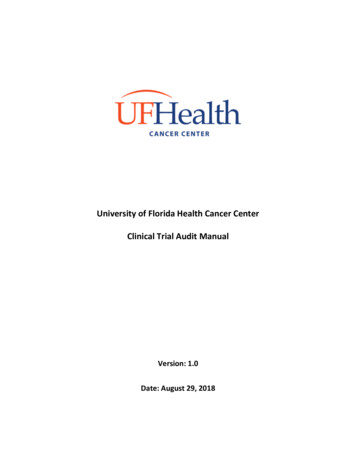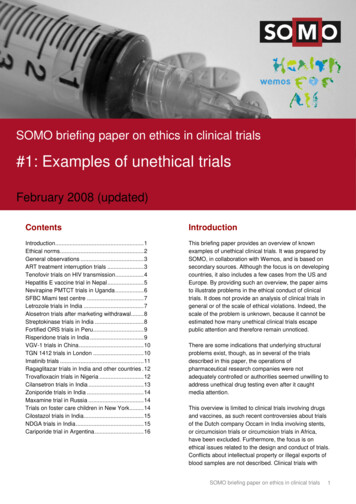
Transcription
Examples of unethical trialsSOMO briefing paper on ethics in clinical trials#1: Examples of unethical trialsFebruary 2008 (updated)ContentsIntroductionIntroduction.1Ethical norms.2General observations .3ART treatment interruption trials .3Tenofovir trials on HIV transmission.4Hepatitis E vaccine trial in Nepal.5Nevirapine PMTCT trials in Uganda.6SFBC Miami test centre .7Letrozole trials in India .7Alosetron trials after marketing withdrawal.8Streptokinase trials in India .8Fortified ORS trials in Peru.9Risperidone trials in India .9VGV-1 trials in China.10TGN 1412 trials in London .10Imatinib trials .11Ragaglitazar trials in India and other countries .12Trovafloxacin trials in Nigeria .12Cilansetron trials in India .13Zoniporide trials in India .14Maxamine trial in Russia .14Trials on foster care children in New York.14Cilostazol trials in India.15NDGA trials in India.15Cariporide trial in Argentina.16This briefing paper provides an overview of knownexamples of unethical clinical trials. It was prepared bySOMO, in collaboration with Wemos, and is based onsecondary sources. Although the focus is on developingcountries, it also includes a few cases from the US andEurope. By providing such an overview, the paper aimsto illustrate problems in the ethical conduct of clinicaltrials. It does not provide an analysis of clinical trials ingeneral or of the scale of ethical violations. Indeed, thescale of the problem is unknown, because it cannot beestimated how many unethical clinical trials escapepublic attention and therefore remain unnoticed.There are some indications that underlying structuralproblems exist, though, as in several of the trialsdescribed in this paper, the operations ofpharmaceutical research companies were notadequately controlled or authorities seemed unwilling toaddress unethical drug testing even after it caughtmedia attention.This overview is limited to clinical trials involving drugsand vaccines, as such recent controversies about trialsof the Dutch company Occam in India involving stents,or circumcision trials or circumcision trials in Africa,have been excluded. Furthermore, the focus is onethical issues related to the design and conduct of trials.Conflicts about intellectual property or illegal exports ofblood samples are not described. Clinical trials withSOMO briefing paper on ethics in clinical trials1
Examples of unethical trialsdramatic outcomes but no apparent ethical or legalshortcomings, such as the probiotics trial in Dutchhospitals, fall outside the scope of the overview too.For each trial, selected information sources areprovided. Most sources are publicly accessiblewebsites, but some require a subscription.The first version of this briefing was published inNovember 2006. The present version, which is thesecond update, does not include new cases but addsmore recent developments on several trials, takes intoaccount feedback from three companies, and hasupdated sources.Ethical normsThe case descriptions also refer to norms in widelyaccepted international codes that have (probably) beenviolated. The most cited reference is the Declaration ofHelsinki (DoH) of the World Medical Association (WMA).European regulations specify that the trials providing theunderlying data for marketing applications of new drugsneed to comply with the Declaration of Helsinki. TheWorld Health Organization (WHO) Guidelines for GoodClinical Practice (GCP) for trials on pharmaceuticalproducts also endorses the DoH as the accepted basisfor clinical trial ethics. Some important paragraphs fromthe declaration are briefly summarized below.8.Vulnerable research populations require specialprotection.11. Research must be based on knowledge oflaboratory and animal experimentation.13. The protocol for a clinical trial should bereviewed by an independent ethical reviewcommittee. The researchers must report anyserious adverse events to this committee.16. The design of all studies should be publiclyavailable.17. Investigations should be ceased if the risks arefound to outweigh the potential benefits.19. The research is only justified if there is areasonable likelihood that the populations inwhich the research is carried out stand tobenefit from the results of the research.20. Participation in a trial must be voluntary andparticipants must be informed.22. Physicians should obtain freely-given informedconsent from each participant.24. Subjects who cannot provide informed consentthemselves, for example children, should onlybe included in the research cannot beperformed on other subjects instead.29. The benefits, risks, burdens and effectivenessof a new therapy should be tested againstthose of the best currently available therapy.Placebo-controlled trials are only allowed if noproven therapy exists or under specialcircumstances.30. At the conclusion of the study, all trialparticipants should be assured access to thebest proven therapy identified by the study.Post-trial access arrangements must bedescribed in the trial protocol.31. When medical research is combined withmedical care, the physician should inform thepatient which aspects of the care are related tothe research.As placebo-controlled clinical trials (DoH §29) arecurrently a standard practice rather than an exception(for phase III studies), this overview does not includetrials that could be considered controversial solelybecause drugs were tested against placebos whereproven alternatives already existed.Some examples of trials with controversial use ofplacebos can be found in: SOMO, “Ethics for Drug Testing in Low and MiddleIncome Countries: Considerations for European MarketAuthorisation,” Feb 2008, http://www.somo.nl (forthcoming). VBDO, “CSR voting advice: Discharge of executiveboard members,” Akzo Nobel case, Aug 2007, http://www.somo.nl/html/paginas/pdf/VBDO Sustainable voting advice report.pdf (Jan 2008), p. 20-21.Furthermore, despite recent initiatives to increasetransparency about drug trials, the design of moststudies is still not publicly available (DoH §16).Therefore this principle was also not used as a selectioncriterion for the overview of unethical clinical trials in thisSOMO briefing paper on ethics in clinical trials2
Examples of unethical trialspaper. The lack of transparency does limit the amount ofinformation available on the studies described below,because in most cases it appears the study design isindeed not publicly available.General observationsEven though the overview below is necessarilyincomplete and biased towards unethical trials that havecaught some publicity, some general observations canstill be made.Firstly, unethical trials have occurred around the world,in both developed and developing countries. In somecases, the trials had not been approved by an ethicalreview committee or institutional review board, orapproval had be given for an unethical trial design.Hence there appear to be flaws, and sometimes ratherserious ones, in the regulatory systems of variouscountries.Secondly, the research organizations involved rangefrom relatively unknown local companies to leadingmultinational corporations. This might be surprising,given that large multinational corporations usually haveclear public commitments to high ethical standards inclinical trials.Thirdly, some of the unethical trials are of a recent date,some were even being carried out in 2005 or later.Although it is sometimes argued that instances ofunethical clinical trials are isolated and outdated, this isnot always true. Note that some older cases have beenincluded in the overview as well, mainly because thedevelopments following these trials are still going on.And finally, the nature of ethical concerns appears to berather diverse and relates to all paragraphs of the DoHsummarized above. The lack of voluntary, informedparticipation and adequately informed consent areprobably the most common problems. Cases of trialsthat did not undergo adequate ethical review or failed toreport serious adverse events indicate flaws in theregulation of clinical trials. Tests with experimentaldrugs of which the safety for testing in humans had notyet been fully established may be among the mostalarming examples.ART treatment interruption trialsDrugs:lamivudine/zidovudine (Combivir) tenofovir (Viread) or nevirapine(Viramune) or abacavir (Ziagen)(DART trial)Treatment:Sponsors:Anti-retroviral therapy (ART)UK Medical Research Council (MRC),Rockefeller Foundation, DfID(Uganda), GlaxoSmithKline, Gilead,Boehringer-Ingelheim2003 – 2006 (DART trial)Uganda, Zimbabwe, Côte d’IvoirePeriod:Location:Unethical aspects:The Development of Anti-Retroviral Therapy in Africa(DART) trial was an open, randomised trial to comparestandard continuous therapy (CT) with structuredtreatment interruption (STI) of 12 weeks on and 12weeks off anti-retroviral therapy (ART). The trial hadrecruited 3,300 volunteers at the Joint Clinical ResearchCentre (Kampala, Uganda), the MRC/UVRI UgandaResearch Unit on AIDS (Entebbe), and the University ofZimbabwe College of Health Sciences (Harare). On 14March 2006, it was decided that all patients in the STIarm of the trial would be switched to continuous therapyas interim data demonstrated they had a greater rate ofclinical HIV-related disease.Critics say they had sounded alarms the year beforealready because of the relatively high number offatalities in the STI arm in Uganda, but investigatorsreplied their concerns were unfounded. Attempts to putpatients whose situation deteriorated during treatmentinterruption back on ART failed and some of the patientsdied during the interruption period. There have alsobeen complaints about enrolment of patients desperateto get free treatment, insufficient arrangements for posttrial treatment access, the use of a drug regimen that isnot readily available to the general population, andomission of important risks in the consent forms.Similar ethical concerns apply to the Strategies forManagement of Anti-Retroviral Therapy (SMART) trial,which compared continuous ART with episodic drugtreatment as well. The Data and Safety MonitoringBoard (DSMB) also found that treatment interruptionwas associated with a higher risk of diseaseprogression. Enrolment in the SMART trial was haltedtwo months earlier, in January 2006, and re-initiation ofinterrupted therapy was recommended.SOMO briefing paper on ethics in clinical trials3
Examples of unethical trialsTrivacan is another ART trial with two treatmentinterruption arms. For one group of patients thetreatment interruption is determined by CD4 cell counts,a measure for the functioning of the patients’ immunesystem. For a second group the treatment is interruptedaccording to a fixed schedule. The Trivacan trialenrolled approximately 840 patients in Côte d’Ivoiresince 2002 and still ongoing.Violated norms (DART trial): DoH §17: Investigations may not have beenceased in time after a negative risk/benefit balancefor STI was identified. DoH §19: The population is which the research wascarried out might not benefit from the results of thestudy, as tenofovir is not readily available in Ugandaand Zimbabwe.DoH §22: Voluntary informed consent was obtainedfor each patient, but this may have beencompromised by patients being desperate to getaccess to free treatment, and risks may not havebeen sufficiently explained.DoH §30/20: Post-trial access arrangements wereunclear and apparently not described in the trialprotocol. This would also effectively inhibit patients toleave the trial.Outcome:The investigators of the DART trial denied lethal sideeffects of treatment interruption and ethicalshortcomings in the trials. On 17-19 July 2006, theOffice of AIDS Research (OAR) of the US NationalInstitutes of Health (NIH) and the Treatment ActionGroup (TAG) held an international workshop to discussthe conduct of STI and intermittent therapy trials. Areview of available evidence confirmed that some trialparticipants were at increased risk of adverse events,including death. It was concluded that STI trials cannotbe recommended until the findings from past trials havebeen better understood.Sources: R.M. Kavuma, “AIDS research kill 50 – angry activistsclaim,” Weekly Observer (Uganda), 8 Jun 2006. MRC, “DART trial moves patients from interrupted tocontinuous antiretroviral therapy (ART),” 14 Mar 2006, seFINAL14Mar06.pdf (Jan 2008). DART website, last updated 15 Mar 2006, http://www.ctu.mrc.ac.uk/dart (Jan 2008). NIH, “Clinical Alert: International HIV/AIDS Trial FindsContinuous Antiretroviral Therapy Superior to EpisodicTherapy,” html (Jan 2008). Correspondence about DART and SMART trials, ITPCdiscussion group, treatmentpreparedness (Jan 2008). ANRS, Press release, “Côte d'Ivoire: La recherchecontinue,” 24 Apr 2006, http://www.anrs.fr/index.php/anrs/rubriques transversales/presse (Jan 2008). ”Report from the Workshop on HIV STI /IntermittentTherapy", held 17-19 Jul 2006 in London, http://www.oar.nih.gov/public/NIH OAR STI IT Report Final.pdf (Jan 2008).Tenofovir trials on ganization:Period:Location:Tenofovir (Viread)Prevention of HIV transmissionGilead, US CDC, Bill and MelindaGates FoundationFamily Health International (FHI) inAfrica, US NIH in Cambodia2004 – 2005Cameroon, Thailand, NigeriaUnethical aspects:In Cameroon five women became HIV-infected whileenrolled in the Tenofir-study. Non-governmentalorganisations (NGOs) claim the 400 sex workersparticipating in the trial were not adequately informedabout the risks and only English information was givento mostly French speaking volunteers. There was a lackof ARVs for patients infected during the trial.In Thailand, key community groups including the ThaiDrug Users Network (TDN) and the Thai AIDSTreatment Advocacy Group (TTAG) claim theirconcerns have been ignored by the trial investigatorsand they were not consulted about the trial design andconduct until a very late stage. They are concerned thatintravenous drug users participating in the trial inThailand will not have access to free, clean syringesthrough needle exchange programmes. In case the drugwould be effective, the researchers had not ensured aroll-over study to take care of trial participants in theinterim period between study closure and marketingapproval. Furthermore, only one year of free post-trialaccess was negotiated, even though in Thailand at leasttwo years of post-trial drug access would be the norm.SOMO briefing paper on ethics in clinical trials4
Examples of unethical trialsIn Cambodia, the Women’s Network for Unity, a localunion of sex workers protested as they perceived thatmedical insurance for trial participants would beinsufficient. FHI cancelled the study in Nigeria giving asa reason that the quality of the local study team wasinadequate, but activists claim that FHI wanted to avoidanother scandal and cancelled the trial a few daysbefore the release of the Nigeria HIV Vaccine andMicrobicide Advocacy Group (NIHMAG) report (seesources). Similar trials were planned in Ghana, Peru,Botswana, and Malawi.Violated norms: DoH §8: Vulnerable subjects may not have receivedthe required special protection. DoH §22: Participants had not been adequatelyinformed. DoH §30: Post-trial access arrangements wereinsufficient.Outcome:The trials were cancelled in Cameroon in March 2005.Trials in Cambodia were cancelled in 2004 byCambodian authorities. The impending study in Nigeriawas cancelled by FHI. Community groups in Thailandasked for establishment of a broad committee toaddress key HIV issues, involvement in trial outreachand education and ensuring at least two years of posttrial tenofovir access to trial participants.Sources: “FHI ends clinical trial of ARV drug Tenofovir,” PlusNEWS, 10 Aug 2005, http://www.plusnews.org/AIDSreport.asp?ReportID 5118&SelectRegion West Africa&SelectCountry CAMEROON (Jan 2008). “Ethical issues involved in the Cambodia Tenofovirtrials,” Global Campaign News, Issue 41, 14 Sep 2004, (1).pdf (Jan 2008). Kaiser network, “Cambodian Prime Minister Says HeOpposes Testing HIV/AIDS Drugs on Residents,” 4 Aug2004, http://www.kaisernetwork.org/daily reports/print report.cfm?DR ID 25099&dr cat 1 (Jan 2008). A. Chua, N. Ford, D. Wilson & P. Cawthorne, PLoSMedicine, 25 Oct 2005, “The Tenofovir Pre-ExposureProphylaxis Trial in Thailand: [ ],” http://medicine.plosjournals.org/perlserv/?request getdocument&doi 10.1371/journal.pmed.0020346 (Jan2008). “The trial of tenofovir trials,” The Lancet, Vol. 365, 26Mar 2005, p. 1111, IIS014067360571850X/fulltext (Jan 2008). A. Jack & A. Kazmin, “Thai Aids campaigners questionnew clinical trials,” Financial Times, 12 Mar 2005, 000e2511c8.html (Jan 2008). NIHMAG, “Report of the outcome of dialogue [ ],”2005, igeria HIV Vaccine Report.pdf (Jan 2008). Correspondence about tenofovir trials, ITPC group, treatmentpreparedness (Jan 2008). CDC website, “CDC Trials of Daily Oral Tenofovir forPreventing HIV Infection,” http://www.cdc.gov/hiv/PUBS/TenofovirFactSheet.htm (Jan 2008).Hepatitis E vaccine trial in NepalDrugs:Sponsors:Period:Location:Hepatitis E vaccineGSK, Walter Reed Army Institute ofResearch2001 – 2003Kathmandu, NepalUnethical aspects:In 1998, GSK and the Walter Reed Institute, whichconducts medical research for the US army, startedcooperating to develop a Hepatitis E vaccine. HepatitisE is a comon disease in poor countries and there havebeen outbreaks in countries where US troops aredeployed. Preparations for phase II trials were made inFebruary 2000. Before launching the trials, GSK hadalready decided the vaccine would not be commerciallydeveloped for a travellers’ market, while Walter Reeddecided it would be unsuitable for US soldiers. Still,GSK and Walter Reed went ahead with phase II trialsand wanted to test the candidate vaccine on 8,000Nepalese volunteers in Lalitpur, without a plan to furtherdevelop the vaccine and make it available to the localpopulation if the trials were successful.The Nepalese NGO Lumanti and municipal officersprotested against the tests in Lalitpur because themajority of its population is illiterate and highlyvulnerable. Walter Reed then decided to test thevaccine on 2,000 soldiers offered by the RoyalNepalese Army as volunteers. However, the soldierswere also considered a vulnerable group as they arepoor and potentially subject to coercion by theirsuperiors.SOMO briefing paper on ethics in clinical trials5
Examples of unethical trialsViolated norms: DoH §8: Vulnerable subjects may not have receivedthe required special protection. DoH §19: The population where the research wascarried out is unlikely to benefit from the study. DoH §22: Consent may not have been fully informedand freely-given. DoH §30: Post-trial access arrangements wereapparently lacking.Outcome:In March 2006, civil society groups sent a letter to GSKdemanding that the vaccine is made available for free tothe Royal Nepalese Army and the Lalitpur communityand offered to the Nepali Ministry of Health at not-forprofit prices. Furthermore, GSK should sign prioragreements with the communities impacted by theresearch to ensuring post-trial access if the vaccine isapproved before further testing takes place. Apparently,the company did not publicly respond to the letter.In March 2007, the results of the study were publishedin the New England Journal of Medicine (NEJM). InJune 2007, the NEJM published two letters to theeditor, reiterating the need to further develop thevaccine and make it available to the Nepalesecommunity, and a response from GSK. The companyexplained that measures had been taken ‘to remove theinfluence of military commanders over participation bysubordinates’ and that most soldiers approached for thetrial refused to participate. GSK affirmed that it iscommitted to continue development of the Hepatitis Evaccine so that it can be available in Nepal, but calls forexternal financing for the introduction of the vaccinethrough partnerships.Sources: Letters to the Editor by S. Basu & P. Lurie and by A.Bhattarai; Reply by the Authors B.L. Innis, M.P.Shrestha & R. McNair Scott, NEJM 356(23), 7 Jun 2007,p. 2421-2. S. Sarkar, “Nepal questions US Army vaccineexperiments,” ISN Security Watch, 12 Jan 2006, http://www.isn.ethz.ch/news/sw/details.cfm?id 14309 (Jan 2008). M. Logan, “Nepal: Guinea Pigs in Hepatitis E VaccineTrials,” IPS News Agency, 6 Feb 2006, http://ipsnews.org/news.asp?idnews 32047 (Jan2008). A. Jack, “GSK is criticised for army drug test,” FinancialTimes, 1 Mar 2006. J. Andrews, “U.S. Military Sponsored Vaccine Trials andLa Resistance in Nepal,” The American Journal ofBioethics, Vol. 5(3), May-Jun 2005, http://www.bioethics.net/journal/j articles.php?aid 713 (Jan 2008). J. Andrews, "Research in the Ranks: VulnerableSubjects, Coercible Collaboration, and the Hepatitis EVaccine Trial in Nepal," Perspectives in Biology andMedicine, Vol. 49(1), winter 2006, p. 35-5. K. Fleming-Michael, “Hepatitis E vaccine trials:compilation,” INSN, 1 Nov 2001, http://66.116.151.85/?p 2878 (Jan 2008).Nevirapine PMTCT trials in rapine (Viramune)HIV prevention of mother to childtransmission (PMTCT)Boehringer Ingelheim (BI), US NationalInstitutes of Health (NIH)1997 – 2003UgandaUnethical aspects:In the HIVNET 012 trial, investigators failed to getpatients’ consent about changes in the experiment andadministered wrong doses. There were seriousproblems in record keeping and delays andunderreporting of fatal and life threatening problems.Fourteen deaths were not reported. Researchersacknowledged thousands of side effects and adversereactions were not disclosed. Procedures for divulgingSerious Adverse Events (SAEs) were not followed.Boehringer Ingelheim, the company that markets thedrug and audited the trial, asked the US NationalInstitutes of Health (NIH) to destroy an early copy of theresearch report in case the study would be audited bythe US Food and Drug Authority (FDA).Violated norms: DoH §13: Serious adverse events were not reported.DoH §22: Informed consent from participants aboutchanges in the trial protocol was not obtained.Outcome:Problems were revealed in early 2002 and BoehringerIngelheim withdrew its FDA marketing application. In2004, the FDA recommended the NIH to stop using thedrug with certain patients in Africa and issued warningsabout side effects. Boehringer Ingleheim (BI) stated that‘the trial was conducted under the sole responsibility ofSOMO briefing paper on ethics in clinical trials6
Examples of unethical trialsthe NIH. BI at no point covered up any information ordestroyed any documents.’Violated norms: DoH §8: Vulnerable subjects may not have receivedthe required special protection. DoH §13: Ethical review committees were not fullySources: J. Solomon, “AP Exclusive: Top U.S. officials warned ofconcerns before AIDS drug sent to Africa,” AP, 13 Dec2004, http://www.lubbockonline.com/stories/121304/upd 075-4013.shtml (Jan 2008). “Selected documents AP obtained in the investigation ofnevirapine's use in Uganda,” from AP website, http://www.honestdoctor.org/documents.html (Jan2008). Author’s correspondence with BI, Apr 2007.SFBC Miami test ocation:VariousPfizer, Merck & Co, Johnson &Johnson, Schering-Plough,Theravance, Purdue Pharma,AstraZeneca, and othersSFBC2000 – 2005Miami, USindependent. DoH §20: Participants were not allowed to leave thetrials. DoH §22: Participants had not been adequatelyinformed.Outcome:SFBC denied the allegations. The company threatenedto arrange federal deportation of Latin Americanimmigrants who disclosed unethical aspects of theclinical trials and tried to make them sign falsestatements. Several top officials of the companyresigned. In May 2006, SFBC announced that it willclose down the test centre in Miami and move planneddrug trials to Canada. The US Senate performedinvestigations into the company’s conduct.Sources: D. Evans, M. Smith & L. Willen, “Big pharma’s shamefulsecret,” Dec 2005, http://www.bloomberg.com/specialreport/pharma.pdf (Jan 2008). Bloomberg website, “Special Report: Big Pharma'sShameful Secret,” tml (Jan 2008).Unethical aspects:In November 2005, a special Bloomberg report revealedinappropriate testing at that the SFBC test centre inMiami. The US Food and Drug Administration (FDA)had already discovered significant violations in 2000and 2002. SFBC is a contract research organization(CRO), a company that carries out clinical trials for largepharmaceutical companies. The trial participants arelargely poor immigrants from Latin America.Letrozole trials in IndiaIn some cases, trial participants had not been fullyinformed about the risks of the trials and receivedmisleading and confusing explanations. Consent formswere not fully read and informed consent was notadequately verified by SFBC employees. Furthermore,participants were not always allowed to leave the trialsat any time. Payments were heavily back loadedtowards the end of the trial, causing inappropriatepressure to complete a trial. Finally, there existedconflicts of interests regarding the approval of trials.One of the Institutional Review Boards (IRBs) chargedwith the review of protocols for trials to be carried out atSFBC was owned by the wife of the SFBC VicePresident.Unethical aspects:Letrozole, which belongs to the group of aromataseinhibitors, was tested by Sun Pharmaceuticals to induceovulation. The drug has been approved globally for thetreatment of breast cancer in post-menopausal women,but it is not approved for any other use in any country.More than 400 women who had been trying in vain toconceive were enrolled in 2003 without their knowledgeor consent to take part in clinical trials conducted at nineor more centres across rozoleInducing ovulationSun Pharmaceuticals2003IndiaSOMO briefing paper on ethics in clinical trials7
Examples of unethical trialsViolated norms: DoH §20: Subjects were not informed they wereparticipating in a trial. DoH §22: Informed consent was not obtained.Outcome:A complaint on the letrozole case was filed in theSupreme Court by the Delhi-based NGO Social Jurist.Novartis, who was not involved with the study butmarkets letrozole under the brand name Femara, sent aclarification letter to all infertility experts in India toremind them of the approved indication.potentially linked to Lotronex had been reported.However, 7,500 trial participants in other countriescontinued to take the drug after it was withdrawn in theUS.Violated norms: DoH §17: Investigations were not ceased after therisks were found to outweigh the potential benefits.Outcome:The company responded that it would take until the endof December 2000 to phase out the studies.Sources:Sources: J. Padmini, “Social Jurist to slap criminal suit on M.P. Flaherty, D. Nelson, and J. Stephen, “The BodyHunters: Overwhelming the Watchdogs,” WashingtonPost, 18 Dec 2000, 0Dec15, 0Dec15 (Jan 2008).nimesulide makers,” Express Healthcare Management,15 Apr 2004, ma01.shtml (Jan 2008). J. Padmini, “Social Jurist to file PIL on illegal letrozoletrials,” Express Pharma Pulse, 8 Jan 2004, ory01.shtml (Jan 2008).Streptokinase trials in India I. Basu, “India's clinical trials and tribulations,” AsiaTimes, 23 Jul 2004.Drugs: T.V. Padma, “India’s drug tests,” Nature, Vol. 436, 28Treatment:Jul 2005, p. 485. ”Letrozole trials: Misdeeds of self-styled ‘Researchers’,Hundreds of Women Used as Guinea Pigs,” Editorial,Monthly Index of Medical Specialities (India), Dec 2003. C.M. Gulhati, “Needed: closer scrutiny of clinical trials,”Indian Journal of Medical Ethics, Vol.12(1), Jan-Mar2004, http://www.issuesinmedicalethics.org/121ed004.html (Jan 2008).Alosetron trials after :Location:alosetron HCl (Lotronex)Treatment for Irritable BowelSyndrome (IBS)Glaxo Wellcome (nowGlaxoSmithKline)2000Various countriesUnethical aspects:In November 2000, Glaxo Wellcome withdrew its drugLotronex from the US market because of FDA safetyconcerns. Serious complications and three deathsSponsors:Period:Location:streptokinase (Streptokinnese /Streptase) and insulinClot-busting drug used in heartattacks, diabetesShanta Biotechnics (streptokinase),Biocon (insulin)2003Hyderabad, IndiaUnethical aspects:The companies had openly conducted illegal phase IIIclinical trials of new drugs on unaware patients and hadconducted improper clinical trials without permissionfrom the Genetic Engineering Approval Committee(GEAC). Eight patients d
to illustrate problems in the ethical conduct of clinical trials. It does not provide an analysis of clinical trials in general or of the scale of ethical violations. Indeed, the scale of the problem is unknown, because it cannot be estimated how many unethical clinical trials escape public attention and therefore remain unnoticed.


